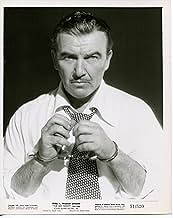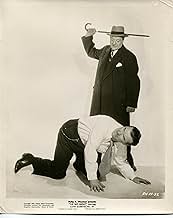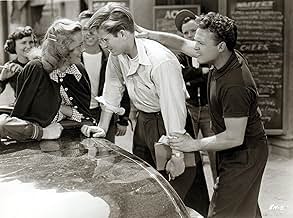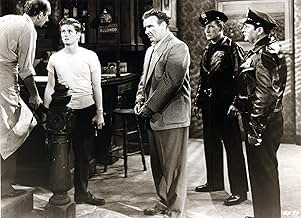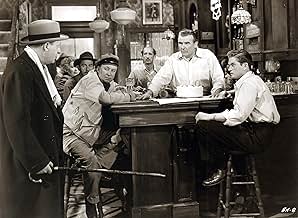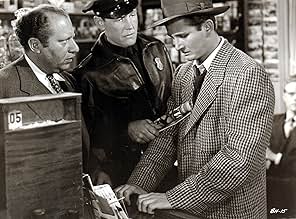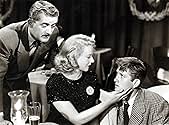CALIFICACIÓN DE IMDb
6.3/10
1.3 k
TU CALIFICACIÓN
Un adolescente alcanza la mayoría de edad mientras busca vengarse del hombre que golpeó a su padre.Un adolescente alcanza la mayoría de edad mientras busca vengarse del hombre que golpeó a su padre.Un adolescente alcanza la mayoría de edad mientras busca vengarse del hombre que golpeó a su padre.
- Dirección
- Guionistas
- Elenco
John Drew Barrymore
- George La Main
- (as John Barrymore Jr.)
Howland Chamberlain
- Flanagan
- (as Howland Chamberlin)
Emile Meyer
- Peckinpaugh
- (as Emil Meyer)
Mauri Leighton
- Terry Angelus
- (as Mauri Lynn)
Robert Aldrich
- Ringsider at Fight
- (sin créditos)
Walter Bacon
- Boxing Match Spectator
- (sin créditos)
Benjie Bancroft
- Bar Patron
- (sin créditos)
Robert Bice
- Taxi Driver
- (sin créditos)
Willie Bloom
- Boxing Match Spectator
- (sin créditos)
Chet Brandenburg
- Boxing Match Spectator
- (sin créditos)
Lane Chandler
- Printer
- (sin créditos)
Edmund Cobb
- Cop
- (sin créditos)
Opiniones destacadas
The tale is based on an obscure novel called The Dreadful Summit by author/screenplay-writer Stanley Ellin. The script for the film appears to be a jumbled mess, but each segment has great independent value that is the result of an intelligent Losey touch. The lovely remarkable scenes are the following:
A. Young bespectacled George bullied by friend to kiss a girl whom he likes B. A birthday cake with lighted candles given by his father that George is unable to blow out in full, One remains lit ominously. The cake serves as a reminder that the entire film deals with happenings of a single day. At the last scene the cake reappears to remind us of it. C. What appears to be real is proved unreal time and time again. D. The left-sympathizing Losey and friends made the film with a cleverness missing in other films of the day. Closure of the bars's curtains by the assistant to George's dad is a symbolic in an odd way. E. The small bitter role given to the enigmatic "2nd Mrs Citizen Kane" (Dorothy Comingore) as Julie Rostina, after she was hounded out in real life by Randolph Hearst and then the awful McCarthy witch hunt of alleged communists in Hollywood that followed states a story within a story. It is sad the way she died in real life. She had so much potential as an actress. F. The honest appreciation of beauty and talent of a black singer by George leads to so much bitterness of color-based prejudices. Losey adds a black poodle in chains in that scene. G The two kisses of George in the film are so different (the opening sequence and later one with Marion)
These sequences are all wonderful, though the film never comes together. Yet it is a notable statement of undying love by a husband for his wayward wife and also of a motherless young man trying to love women and eventually grow up to be a good husband.
A. Young bespectacled George bullied by friend to kiss a girl whom he likes B. A birthday cake with lighted candles given by his father that George is unable to blow out in full, One remains lit ominously. The cake serves as a reminder that the entire film deals with happenings of a single day. At the last scene the cake reappears to remind us of it. C. What appears to be real is proved unreal time and time again. D. The left-sympathizing Losey and friends made the film with a cleverness missing in other films of the day. Closure of the bars's curtains by the assistant to George's dad is a symbolic in an odd way. E. The small bitter role given to the enigmatic "2nd Mrs Citizen Kane" (Dorothy Comingore) as Julie Rostina, after she was hounded out in real life by Randolph Hearst and then the awful McCarthy witch hunt of alleged communists in Hollywood that followed states a story within a story. It is sad the way she died in real life. She had so much potential as an actress. F. The honest appreciation of beauty and talent of a black singer by George leads to so much bitterness of color-based prejudices. Losey adds a black poodle in chains in that scene. G The two kisses of George in the film are so different (the opening sequence and later one with Marion)
These sequences are all wonderful, though the film never comes together. Yet it is a notable statement of undying love by a husband for his wayward wife and also of a motherless young man trying to love women and eventually grow up to be a good husband.
Uneven film that at times seems to drift. Still, there are genuinely compelling moments, as when burly dad LeMaine (Foster, in a fine performance) meekly submits to a brutal cane lashing that had me cringing. Why he's submitting remains a puzzle until the end. Because of the beating, Dad's insecure son George (Barrymore Jr.) spends the movie's remainder trying to avenge his father.
Beneath the revenge narrative, however, is really a rite-of-passage story. For example, in a not very believable opening, a cringing George is pounded in humiliating fashion by his teenage peers. We're given no explanation, nor does actor Barrymore physically resemble an easy mark. It's not a promising beginning. Then, in a much more persuasive scene, Dad casts a slightly disapproving eye over his nervous son's birthday cake (symbolic of the story). So the kid must prove himself not only to Dad, but to himself.
It's not a tight screenplay. Events more or less simply follow one another, tied together by the theme of vengeance. Happily, however, the narrative doesn't drag. Actor Barrymore Jr. had a rather brief career despite the pedigree. One thing for sure, he's certainly different looking. With a mop of unruly hair and slightly crooked mouth, he's no glamor boy. Nonetheless, his looks are perfect for the role, such that, when he dons a sport coat and hat, he still looks like a kid trying to take a big step up. All in all, the young actor does pretty well in the kind of difficult role that would later go to James Dean. I also like a de-glamorized Joan Lorring, who's a good match for him. My one real complaint is the way Al Judge (St. John) is written. His behavior is so crude and ugly, it's hard thinking of him as a respected sports writer. A racketeer would have been more credible and easier, so the scriptwriters must have had a reason.
Then too, the screenwriters, Butler and Lardner Jr., along with director Losey, were all blacklisted during Hollywood's commie hunting period. I suspect it was their leftist leanings that are responsible for one of the film's most arresting sequences. George goes to a nightclub where a drop-dead beautiful black songstress (Mauri Lynn) entertains. Afterward, he encounters her outside and is compelled to compliment her looks and talent. She glows at the flattering remark. Trouble is his heartfelt momentum carries over to the unspoken qualification "for a Negro woman". She grasps the unfortunate hanging-in-the-air racial reference, and is reminded of her not-fully-equal status. Thus, disappointment clouds her former glow. It's a beautifully played moment and quite powerful in emotional impact. I wonder what happened to that fine actress.
Anyway, the movie does have a number of effective noir touches, especially George's twilight escape through LA's towering industrial district. It's a mysterious world so much larger than himself. All in all, the film is oddly memorable, thanks, I think, to Barrymore's unusual presence. I know I sought it out on DVD, lo, so many years after having first seen it in a theatre.
(In passing—the burly guy sitting next to Barrymore and Bourneuf ringside at the fights is Robert Aldrich, the great director of such classics as Kiss Me Deadly {1955} and Attack {1956}.)
Beneath the revenge narrative, however, is really a rite-of-passage story. For example, in a not very believable opening, a cringing George is pounded in humiliating fashion by his teenage peers. We're given no explanation, nor does actor Barrymore physically resemble an easy mark. It's not a promising beginning. Then, in a much more persuasive scene, Dad casts a slightly disapproving eye over his nervous son's birthday cake (symbolic of the story). So the kid must prove himself not only to Dad, but to himself.
It's not a tight screenplay. Events more or less simply follow one another, tied together by the theme of vengeance. Happily, however, the narrative doesn't drag. Actor Barrymore Jr. had a rather brief career despite the pedigree. One thing for sure, he's certainly different looking. With a mop of unruly hair and slightly crooked mouth, he's no glamor boy. Nonetheless, his looks are perfect for the role, such that, when he dons a sport coat and hat, he still looks like a kid trying to take a big step up. All in all, the young actor does pretty well in the kind of difficult role that would later go to James Dean. I also like a de-glamorized Joan Lorring, who's a good match for him. My one real complaint is the way Al Judge (St. John) is written. His behavior is so crude and ugly, it's hard thinking of him as a respected sports writer. A racketeer would have been more credible and easier, so the scriptwriters must have had a reason.
Then too, the screenwriters, Butler and Lardner Jr., along with director Losey, were all blacklisted during Hollywood's commie hunting period. I suspect it was their leftist leanings that are responsible for one of the film's most arresting sequences. George goes to a nightclub where a drop-dead beautiful black songstress (Mauri Lynn) entertains. Afterward, he encounters her outside and is compelled to compliment her looks and talent. She glows at the flattering remark. Trouble is his heartfelt momentum carries over to the unspoken qualification "for a Negro woman". She grasps the unfortunate hanging-in-the-air racial reference, and is reminded of her not-fully-equal status. Thus, disappointment clouds her former glow. It's a beautifully played moment and quite powerful in emotional impact. I wonder what happened to that fine actress.
Anyway, the movie does have a number of effective noir touches, especially George's twilight escape through LA's towering industrial district. It's a mysterious world so much larger than himself. All in all, the film is oddly memorable, thanks, I think, to Barrymore's unusual presence. I know I sought it out on DVD, lo, so many years after having first seen it in a theatre.
(In passing—the burly guy sitting next to Barrymore and Bourneuf ringside at the fights is Robert Aldrich, the great director of such classics as Kiss Me Deadly {1955} and Attack {1956}.)
As previous reviewer wrote, saw this on TCM and the sound was terrible. Good story in need of a cleanup. I like hearing dialogue.
As someone who knew John Barrymore Jr. 25 years ago, I was heartbroken to see him early in his aborted film career. Though not as charismatic as James Dean would be just a couple of years later, he was certainly Dean's prototype in The Big Night. Perhaps with a better film and a less disturbed personality, Barrymore might have been a working Hollywood actor for many years to come. Anyway, what director Joseph Losey lacked here was the Los Angeles cityscape he used to full effect that same year in his retelling of Fritz Lang's M. The Big Night was screaming for a location project on downtown L.A.'s seedy, beaten down Bunker Hill, a neighborhood of crumbling Victorian mansions and apartment buildings with vertiginous stairways that provided so much atmosphere to other films, such as Kiss Me Deadly, Criss-Cross, The Exiles and, yes, M. Instead, the movie is stage bound and hemmed in by sets that never look convincing. With its rambling "a night in the life" plot line, The Big Night needed another character: a dark city of real streets, background lights, rambling old house, and dingy clubs and bars. In other words, the kind of verisimilitude that transports the viewer into the protagonist's world. The back lot, unfortunately, was a poor stand-in.
Lots of accused Communists involved in this film, and one spy!
Yes - John Barrymore Jr. Was paid and given an expense account to spy on poor Joseph Losey, the director. Barrymore later confessed to Losey, who forgave him, and the two enjoyed fabulous meals on Barrymore's FBI expense account.
George La Main (John Drew Barrymore) is Georgie, who watches his father caned and beaten brutally by a sportswriter, Al Judge. We don't know why, just that he takes it.
Georgie, only 17, is traumatized and wants revenge. This quest takes him to a prize fight, nightclubs, and apartments in walk-ups in the seedier parts of Los Angeles as apropos the noir atmosphere. What Georgie learns will take him out of his youth. It's disillusioning but it's reality, like it or not.
This is Losey's last film before blacklisting causes him to leave the country. The role of Georgie is a James Dean-type role. Georgie is portrayed as kind of a dork though Barrymore was better looking than this. He does a good job as the tortured young man.
Preston Foster, Howard St. John, Joan Lorring, and Dorothy Comingore (in her last role) provide good support.
In the end, the film, though uneven, shows that secrets and lies can hurt, and people can betray and disappoint you; sadly, it's all part of life's tapestry.
Certainly no one knew that better than Losey, the ruined Comingore, uncredited writers Lardner and Butler, and actor Howard Chamberlin, all part of this film and blacklisted.
Yes - John Barrymore Jr. Was paid and given an expense account to spy on poor Joseph Losey, the director. Barrymore later confessed to Losey, who forgave him, and the two enjoyed fabulous meals on Barrymore's FBI expense account.
George La Main (John Drew Barrymore) is Georgie, who watches his father caned and beaten brutally by a sportswriter, Al Judge. We don't know why, just that he takes it.
Georgie, only 17, is traumatized and wants revenge. This quest takes him to a prize fight, nightclubs, and apartments in walk-ups in the seedier parts of Los Angeles as apropos the noir atmosphere. What Georgie learns will take him out of his youth. It's disillusioning but it's reality, like it or not.
This is Losey's last film before blacklisting causes him to leave the country. The role of Georgie is a James Dean-type role. Georgie is portrayed as kind of a dork though Barrymore was better looking than this. He does a good job as the tortured young man.
Preston Foster, Howard St. John, Joan Lorring, and Dorothy Comingore (in her last role) provide good support.
In the end, the film, though uneven, shows that secrets and lies can hurt, and people can betray and disappoint you; sadly, it's all part of life's tapestry.
Certainly no one knew that better than Losey, the ruined Comingore, uncredited writers Lardner and Butler, and actor Howard Chamberlin, all part of this film and blacklisted.
¿Sabías que…?
- TriviaAccording to interviews that director Joseph Losey gave in the mid-1970s to Michel Ciment, the FBI wanted to spy on him in Europe, where he relocated to work after being blacklisted by Hollywood because of his political activities. So they paid John Drew Barrymore (who became a good friend after this movie) to furnish information about Losey's political activities, if any, in London. Barrymore later met Losey in London and confessed to him about the money and expense account the FBI had given him to spy on Losey. Losey, recalling that the young actor had been under tremendous pressure at the time, forgave him and, in fact, suggested that they have several lavish meals together and put the cost on Barrymore's FBI expense account, which they promptly did.
- ErroresThe magazine racks outside the corner store are mostly issues contemporary to 1951, with one glaring exception. A copy of the famous first issue of The New Yorker (published in 1925).
- Citas
Peckinpaugh: Next time you see somebody drop money, don't think about it so long before you decide to give it back.
- ConexionesFeatured in Vampira: The Big Night 1951 (1956)
Selecciones populares
Inicia sesión para calificar y agrega a la lista de videos para obtener recomendaciones personalizadas
- How long is The Big Night?Con tecnología de Alexa
Detalles
- Fecha de lanzamiento
- País de origen
- Idioma
- También se conoce como
- Die Nacht der Wahrheit
- Locaciones de filmación
- 218 East 12th Street, Downtown, Los Ángeles, California, Estados Unidos(George goes to the old St. Joseph's Church - destroyed by fire and demolished in 1983)
- Productora
- Ver más créditos de la compañía en IMDbPro
- Tiempo de ejecución
- 1h 15min(75 min)
- Color
- Relación de aspecto
- 1.37 : 1
Contribuir a esta página
Sugiere una edición o agrega el contenido que falta



